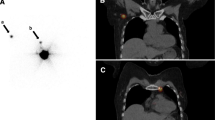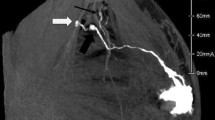Abstract
Background
Controversy exists in the literature regarding the optimal site for lymphatic mapping in breast cancer. This study was designed to characterize lymphatic drainage patterns within the same patient after subareolar (SA) and peritumoral (PT) radiopharmaceutical injections and examine the impact of reader interpretation on reported drainage.
Methods
In this prospective trial, 27 women with breast cancer underwent sequential preoperative SA and PT injections of 0.5 to 2.7 mCi of technetium-99 m filtered sulfur colloid 3 days or more apart. Patterns of radiopharmaceutical uptake were reviewed independently by two nuclear medicine physicians. Inter-reader agreement and injection success were assessed in conjunction with observed drainage patterns.
Results
There was near perfect inter-reader agreement observed on identification of axillary LN drainage after PT injection (P = 0.0004) and substantial agreement with SA injection (P = 0.0344). SA injection was more likely to drain to only axillary LNs, whereas PT injection appeared more likely to drain to both axillary and extra-axillary LNs, although no statistically significant differences were found. All patients with extra-axillary drainage after PT injection (n = 6 patients) had only axillary drainage after SA injection. Dual drainage was observed for six patients with PT injection and one patient with SA injection.
Conclusions
Our findings suggest that radiopharmaceutical injected in the SA location has a high propensity to drain to axillary LNs only. After controlling for patient factors and demonstrating inter-reader agreement, the inability to demonstrate statistically significant differences in drainage based on injection site suggests that lymphatic drainage patterns may be a function of patient and tumor-specific features.

Similar content being viewed by others
References
Albertini JJ, Lyman GH, Cox C, et al. Lymphatic mapping and sentinel node biopsy in the patient with breast cancer. JAMA. 1996;276:1818–22.
Giuliano AE, Kirgan DM, Guenther JM, Morton DL. Lymphatic mapping and sentinel lymphadenectomy for breast cancer. Ann Surg. 1994;220:391–8.
Pijpers R, Meijer S, Hoekstra OS, et al. Impact of lymphoscintigraphy on sentinel node identification with technetium-99 m-colloidal albumin in breast cancer. J Nucl Med. 1997;38:366–8.
Borgstein PJ, Meijer S, Pijpers RJ, van Diest PJ. Functional lymphatic anatomy for sentinel node biopsy in breast cancer: echoes from the past and the periareolar blue method. Ann Surg. 2000;232:81–9.
Grant RN, Tabah EJ, Adair FE. The surgical significance of the subareolar lymph plexus in cancer of the breast. Surgery. 1953;33:71–8.
. Halsell JT, Smith JR, Bentlage CR, et al. Lymphatic drainage of the breast demonstrated by vital dye staining and radiography. Ann Surg. 1965;162:221–6.
Delamere G. The lymphatics. In: Charpy PP (ed). A treatise of human anatomy. Westminster: Archibald Constable; 1903.
Rouviere H. Anatomie des Lymphatiques de l’Homme. Translated into English by Tobias MJ. Ann Arbor, Mich: Edwards Bros. Inc.; 1938.
Sappey MP. Anatomie, Physiologie, Pathologie des vaisseaux Lymphatiques consideres chez L’homme at les Vertebres. Paris: A. Delahaye and E. Lecrosnier; 1874.
Kinmonth JB. Lymphangiography in man; a method of outlining lymphatic trunks at operation. Clin Sci (Lond). 1952;11:13–20.
Suami H, Pan WR, Mann GB, Taylor GI. The lymphatic anatomy of the breast and its implications for sentinel lymph node biopsy: a human cadaver study. Ann Surg Oncol. 2008;15:863–71.
Klimberg VS, Rubio IT, Henry R, et al. Subareolar versus peritumoral injection for location of the sentinel lymph node. Ann Surg. 1999;229:860–5.
Zavagno G, Meggiolaro F, Rossi CR, et al. Subareolar injection for sentinel lymph node location in breast cancer. Eur J Surg Oncol. 2002;28:701–4.
Bauer TW, Spitz FR, Callans LS, et al. Subareolar and peritumoral injection identify similar sentinel nodes for breast cancer. Ann Surg Oncol. 2002;9:169–76.
Kesmodel SB, Canter RJ, Terhune KP, et al. Use of radiotracer for sentinel lymph node mapping in breast cancer optimizes staging independent of site of administration. Clin Nucl Med. 2006;31:527–33.
Maza S, Valencia R, Geworski L, et al. Peritumoural versus subareolar administration of technetium-99 m nanocolloid for sentinel lymph node detection in breast cancer: preliminary results of a prospective intra-individual comparative study. Eur J Nucl Med Mol Imaging. 2003;30:651–6.
Pelosi E, Bello M, Giors M, et al. Sentinel lymph node detection in patients with early-stage breast cancer: comparison of periareolar and subdermal/peritumoral injection techniques. J Nucl Med. 2004;45:220–5.
Shimazu K, Tamaki Y, Taguchi T, et al. Comparison between periareolar and peritumoral injection of radiotracer for sentinel lymph node biopsy in patients with breast cancer. Surgery. 2002;131:277–86.
Byrd DR, Dunnwald LK, Mankoff DA, et al. Internal mammary lymph node drainage patterns in patients with breast cancer documented by breast lymphoscintigraphy. Ann Surg Oncol. 2001;8:234–40.
Kawase K, Gayed IW, Hunt KK, et al. Use of lymphoscintigraphy defines lymphatic drainage patterns before sentinel lymph node biopsy for breast cancer. J Am Coll Surg. 2006;203:64–72.
Babiera GV, Delpassand ES, Breslin TM, et al. Lymphatic drainage patterns on early versus delayed breast lymphoscintigraphy performed after injection of filtered Tc-99 m sulfur colloid in breast cancer patients undergoing sentinel lymph node biopsy. Clin Nucl Med. 2005;30:11–5.
Yared MA, Middleton LP, Smith TL, et al. Recommendations for sentinel lymph node processing in breast cancer. Am J Surg Pathol. 2002;26:377–82.
Greene FL, Page DL, Fleming ID. AJCC cancer staging manual, 6th ed. New York: Springer; 2002.
Chagpar AB, Kehdy F, Scoggins CR, et al. Effect of lymphoscintigraphy drainage patterns on sentinel lymph node biopsy in patients with breast cancer. Am J Surg. 2005;190:557–62.
Chang RF, Chang-Chien KC, Takada E, et al. Three comparative approaches for breast density estimation in digital and screen film mammograms. Conf Proc IEEE Eng Med Biol Soc. 2006;1:4853–6.
Freedman M, Osicka T. Reader variability: what we can learn from computer-aided detection experiments. J Am Coll Radiol. 2006;3:446–55.
Goyal A, Newcombe RG, Mansel RE, et al. Role of routine preoperative lymphoscintigraphy in sentinel node biopsy for breast cancer. Eur J Cancer. 2005;41:238–43.
Hill AD, Tran KN, Akhurst T, et al. Lessons learned from 500 cases of lymphatic mapping for breast cancer. Ann Surg. 1999;229:528–35.
Rodier JF, Velten M, Wilt M, et al. Prospective multicentric randomized study comparing periareolar and peritumoral injection of radiotracer and blue dye for the detection of sentinel lymph node in breast sparing procedures: FRANSENODE trial. J Clin Oncol. 2007;25:3664–9.
Tuthill LL, Reynolds HE, Goulet RJ, Jr. Biopsy of sentinel lymph nodes guided by lymphoscintigraphic mapping in patients with breast cancer. AJR Am J Roentgenol. 2001;176:407–11.
van Rijk MC, Tanis PJ, Nieweg OE, et al. Clinical implications of sentinel nodes outside the axilla and internal mammary chain in patients with breast cancer. J Surg Oncol. 2006;94:281–6.
Dupont EL, Kamath VJ, Ramnath EM, et al. The role of lymphoscintigraphy in the management of the patient with breast cancer. Ann Surg Oncol. 2001;8:354–60.
Krynyckyi BR, Chun H, Kim HH, et al. Factors affecting visualization rates of internal mammary sentinel nodes during lymphoscintigraphy. J Nucl Med. 2003;44:1387–93.
Dupont E, Cox CE, Nguyen K, et al. Utility of internal mammary lymph node removal when noted by intraoperative gamma probe detection. Ann Surg Oncol. 2001;8:833–6.
Galimberti V, Veronesi P, Arnone P, et al. Stage migration after biopsy of internal mammary chain lymph nodes in breast cancer patients. Ann Surg Oncol. 2002;9:924–8.
Sacchini V, Pinotti JA, Barros AC, et al. Nipple-sparing mastectomy for breast cancer and risk reduction: oncologic or technical problem? J Am Coll Surg. 2006;203:704–14.
Veronesi U, Marubini E, Mariani L, et al. The dissection of internal mammary nodes does not improve the survival of breast cancer patients. 30-year results of a randomised trial. Eur J Cancer. 1999;35:1320–5.
Madsen E, Gobardhan P, Bongers V, et al. The impact on post-surgical treatment of sentinel lymph node biopsy of internal mammary lymph nodes in patients with breast cancer. Ann Surg Oncol. 2007;14:1486–92.
Arriagada R, Guinebretiere JM, Le MG. Do internal mammary chain nodes matter in the prognosis of axillary node-negative breast cancer? Acta Oncol. 2000;39:307–8.
D’Eredita G, Ferrarese F, Cecere V, et al. Subareolar injection may be more accurate than other techniques for sentinel lymph node biopsy in breast cancer. Ann Surg Oncol. 2003;10:942–7.
Shimazu K, Tamaki Y, Taguchi T, et al. Lymphoscintigraphic visualization of internal mammary nodes with subtumoral injection of radiocolloid in patients with breast cancer. Ann Surg. 2003;237:390–8.
Eroglu A, Mudun A, Berberoglu K, et al. Comparison of subdermal and peritumoral injection techniques of lymphoscintigraphy to determine the sentinel lymph node in breast cancer. Clin Nucl Med. 2004;29:306–11.
Mudun A, Sanli Y, Ozmen V, et al. Comparison of different injection sites of radionuclide for sentinel lymph node detection in breast cancer: single institution experience. Clin Nucl Med. 2008;33:262–7.
Acknowledgment
Research supported by funding from NIH Avon Supplement 3 P30 CA16672-29S (to G.V. Babiera).
Author information
Authors and Affiliations
Corresponding author
Rights and permissions
About this article
Cite this article
Fearmonti, R.M., Gayed, I.W., Kim, E. et al. Intra-Individual Comparison of Lymphatic Drainage Patterns Using Subareolar and Peritumoral Isotope Injection for Breast Cancer. Ann Surg Oncol 17, 220–227 (2010). https://doi.org/10.1245/s10434-009-0633-z
Received:
Revised:
Accepted:
Published:
Issue Date:
DOI: https://doi.org/10.1245/s10434-009-0633-z




